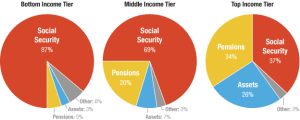 You may have just retired, your pension payments are being deposited into your bank account and you have your savings which is part of your plan for retirement. You know your Retirement income needs to last for the rest of your life. However, what you do not know is how much to take out each year. Some experts believe in preserving capital and just utilize the income. While others use a more general rule of 4% of your principal. Four % could mean that you dig into your capital in years that the incomes are lower than 4%. In the past few years, yields have been very low. If you are conservatively invested in GIC’s for example you are probably making less than the 4% rule. So what is a retired person suppose to do in a situation like this?
You may have just retired, your pension payments are being deposited into your bank account and you have your savings which is part of your plan for retirement. You know your Retirement income needs to last for the rest of your life. However, what you do not know is how much to take out each year. Some experts believe in preserving capital and just utilize the income. While others use a more general rule of 4% of your principal. Four % could mean that you dig into your capital in years that the incomes are lower than 4%. In the past few years, yields have been very low. If you are conservatively invested in GIC’s for example you are probably making less than the 4% rule. So what is a retired person suppose to do in a situation like this?
Retirement income – 4% Rule
The 4% rule fixes your income for as long as your savings last, however, there is no guarantee that your savings will last long enough even with the 4% rule, particularly if there is a bad year in the markets and the value of your portfolio declines substantially. One alternative is to take out only the income that your investments actually generate each year. For example, you could have all dividends, mutual fund income, and bond income deposited as cash into your account and you only draw on this amount from your savings. This way you will never touch the principle and your savings will virtually last forever. If this provides sufficient income then you are indeed well off, but what if this is not enough?
Re-assess the 4% Rule Each year
Some experts feel that you should adjust the 4 % rule based on your needs as well as your portfolio performance. If the markets do decline, and your portfolio is not doing well, can you forgo a payment that year? Can you live off the income that you have from your pensions and the income from your investments? The point is that you may want to re-evaluate the 4% rule each year and make the appropriate decision, with 4% being the upper limit of what you would withdraw in any given year.
Studies have actually shown that a constant withdrawal rate has not performed well for investors in terms of their savings lasting as long as they need it to. Their standard of living begins to fall over time.
How Long Will You Live
Mortality experts believe that the average life span is 74 years of age. However, if you make it to 65 years of age, you actually have a better chance of living until you are in your 80;s simply because you made it to 65 and apparently are taking care of yourself.
When you are evaluating how much money to take out of your savings one of the decisions that need to be made is how long you will live. Someone who lives to 74 can spend more freely than someone who likely will live until age 85. Every year a reassessment of this factor will help you decide how long you will continue to live and your corresponding withdrawal rate from your savings. Someone who is expected to live 10 years might take out 10%, while someone who is expecting to live 20 years might take out 5% i.e. 1/20th.
Can You Live on the Retirement Income Only
Your investment strategy also plays a large part in how much money you will have during retirement. Investing in conservative dividend stocks that grow their dividends over time and have a good record of always paying their dividends will have a much different profile than someone who invests in growth stocks.
Can you live on the income from your portfolio only? If you can this will preserve your capital and allow you to have much more control over your capital as well as maintain your standard of life. Dividend-paying stocks that increase their dividends each year will give you inflationary protection over the retirement years.
There are a lot of strategies to consider. We also suggest that you meet with a financial adviser and discuss some of these strategies. Never follow advice blindly. If it keeps you up at night or you do not understand the advice, continue to gather information before making a decision. Always invest diversely and stay away from high-risk stocks that could decimate your portfolio in a market downturn.